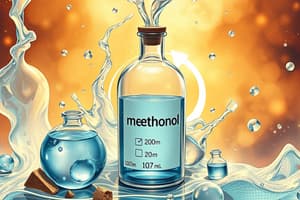Podcast
Questions and Answers
________, also known as wood alcohol, is used as a fuel and as a solvent. Ingestion of this alcohol can lead to blindness and death.
________, also known as wood alcohol, is used as a fuel and as a solvent. Ingestion of this alcohol can lead to blindness and death.
- Methane
- Methoxyol
- Methanol (correct)
- Ethanol
_______ is dissolved in water to make the solution sold commercially as rubbing alcohol.
_______ is dissolved in water to make the solution sold commercially as rubbing alcohol.
- Amyl alcohol
- Isopropyl alcohol (correct)
- Ethanol
- Butanol
What type of orbital do the lone pair electrons on oxygen occupy in ethanol?
What type of orbital do the lone pair electrons on oxygen occupy in ethanol?
- sp
- sp3 (correct)
- σ
- p
- π
1-Methylcyclopentanol is classified as ________.
1-Methylcyclopentanol is classified as ________.
Consider the alcohol 3-methylpentan-3-ol. Is this alcohol primary, secondary, or tertiary?
Consider the alcohol 3-methylpentan-3-ol. Is this alcohol primary, secondary, or tertiary?
In a 1-butanol molecule, what part of the molecule is described as hydrophilic?
In a 1-butanol molecule, what part of the molecule is described as hydrophilic?
Ethanol that contains added impurities that make it unfit for drinking is described as ________.
Ethanol that contains added impurities that make it unfit for drinking is described as ________.
Which of the following reagents or sequences do not produce an alcohol or diol from an alkene starting material?
Which of the following reagents or sequences do not produce an alcohol or diol from an alkene starting material?
Provide the name of the major organic product that results when 1-pentene is subjected to hydroboration/oxidation.
Provide the name of the major organic product that results when 1-pentene is subjected to hydroboration/oxidation.
Which of the following terms best describes the reactive nature of a Grignard reagent?
Which of the following terms best describes the reactive nature of a Grignard reagent?
Reaction of ethylmagnesium bromide with which of the following compounds yields a tertiary alcohol after quenching with aqueous acid?
Reaction of ethylmagnesium bromide with which of the following compounds yields a tertiary alcohol after quenching with aqueous acid?
What combination of Grignard and carbonyl compound can be used to prepare 3-hexanol?
What combination of Grignard and carbonyl compound can be used to prepare 3-hexanol?
How would one use a Grignard-based synthesis to accomplish the following transformation from pentanal (CH3CH2CH2CH2CHO) to heptan-3-ol?
How would one use a Grignard-based synthesis to accomplish the following transformation from pentanal (CH3CH2CH2CH2CHO) to heptan-3-ol?
Flashcards are hidden until you start studying
Study Notes
Alcohols and Their Properties
- Methanol, known as wood alcohol, is toxic and can cause blindness or death if ingested.
- Isopropyl alcohol is commonly used as rubbing alcohol, dissolved in water for commercial use.
- Ethanol that contains impurities making it undrinkable is termed denatured alcohol.
Alcohol Classification
- 1-Methylcyclopentanol is categorized as a tertiary alcohol based on its structure.
- 3-Methylpentan-3-ol is also classified as a tertiary alcohol due to the arrangement of its carbon atoms.
Molecular Structure and Characteristics
- In ethanol, the lone pair electrons on oxygen are situated in an sp3 hybridized orbital.
- The hydroxyl group (OH-) in a 1-butanol molecule is responsible for its hydrophilic property.
Synthetic Reactions and Mechanisms
- Hydroboration/oxidation of 1-pentene primarily yields 1-pentanol as the major product.
- Grignard reagents are classified as nucleophiles, highlighting their potential to react with electrophiles.
- For the creation of tertiary alcohols, ethylmagnesium bromide reacts with acetone ((CH3)2CO) after quenching with acid.
Reagent and Reaction Combinations
- The sequence involving HCO3H does not produce an alcohol from an alkene.
- To produce 3-hexanol from a Grignard synthesis, the combination of CH3CH2MgBr and butyraldehyde (CH3CH2CH2CHO) is required.
- The transformation of pentanal to heptan-3-ol can be achieved using CH3CH2MgBr as the Grignard reagent.
Studying That Suits You
Use AI to generate personalized quizzes and flashcards to suit your learning preferences.




